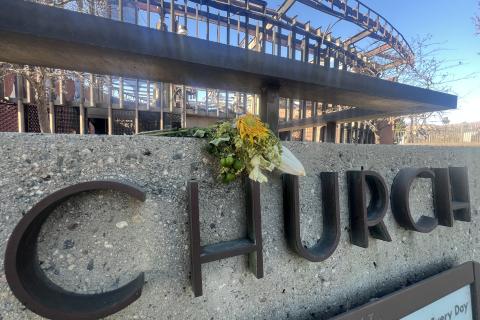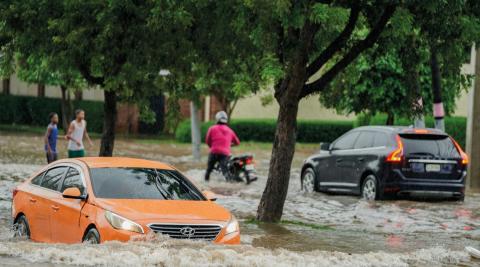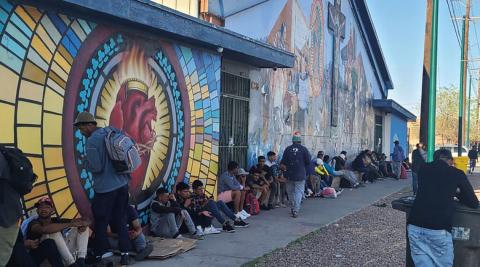
© Generated with Adobe Firefly
How do we begin to have peace with Creation as religious communities when we have literally been at war with it? Our global economic system based on greed and self-centeredness and encouraging a “culture of having” rather than a “culture of giving,” is broken and unsustainable. The negative impacts we witness—climate change, pollution of the land and water, loss of biodiversity and critical natural resources, are widespread and visible. Make no mistake—we have caused this, all of us.
But I want to give you hope that peace with creation is possible. Believe it or not, there are already small signs of peace! And I want to give you encouragement to begin a process of ecological conversion, and start your “pilgrimage of reconciliation” with Creation, a difficult and challenging journey to a more integral ecology. Encouragement is a kind word; I actually want to give you a strong “kick in the pants” to get you going, because that is what is needed if we are going to be successful.
An Ecological Conversion
Nine years ago, Pope Francis strongly voiced his concerns about the planet’s environmental conditions by writing a letter addressed to “every person living on this planet,” called Laudato Si’ (Praise be to you) On Care for Our Common Home. I would encourage you to read it, because it was written to you. The Pope identified our current ecological crisis as a “summons to profound interior conversion,” specifically challenging all of us to be “protectors of God’s handiwork” by letting our own encounter with God become evident in our relationship with the world around us. (LS 217)
He said:
Believers themselves must constantly feel challenged to live in a way consonant with their faith and not to contradict it by their actions. They need to be encouraged to be ever open to God’s grace and to draw constantly from their deepest convictions about love, justice and peace… (LS 200)
In a second letter published near the end of last year titled Laudate Deum (Praise God) To All People of Good Will On The Climate Crisis, the Pope emphasized that the impacts of climate change are getting much worse and that we are not doing enough to make things better. Besides pointing to the failure of global political efforts, he also emphasized this:
[T]here are no lasting changes without cultural changes, without a maturing of lifestyles and convictions within societies, and there are no cultural changes without personal changes. (LD 70)
Do you hear a re-occurring theme? We need to begin to live what we believe!
“I am John, a Catholic, and I am not living sustainably. Everyone, please raise your right hand, and repeat after me.”
A Call to Ecological Action
It all sounds overwhelming, doesn’t it? How can we as individuals led by our faith, or as various religious communities promote an alternative global reality based on the ideals of solidarity, reciprocity and communion to make peace with creation?
Here is where the first bit of hope comes in: As a lay Catholic who has spent his entire forty-year career working in the environmental field, I have, to put it succinctly and in religious terms, been “to the mountain top and seen the promised land,” witnessing not only the devastation caused by the pollution across the globe, but also the successful cleanup of that pollution by many of the corporations that caused it. I’ve also been part of the planning and implementation of programs by those same companies to achieve sustainable practices: reducing waste and water use, eliminating excessive packaging, achieving sustainable energy goals. Progress is possible, and it’s not all doom and gloom.
One guiding principle we can look to is contained in this quote from the American Franciscan priest, Richard Rohr:
We do not think ourselves into new ways of living.
We live ourselves into new ways of thinking.
Just as I became aware of my environmental vocation during the first Earth Day celebration in April 1970 by cleaning up trash along the roadways of my rural Indiana community, so too when we engage in action that personally involves us that we “discover” the powerful connection between doing and really believing. Our action informs not only our mind, but also our heart and soul, and this further feeds our passion to improve things.
And so, we begin our pilgrimage of reconciliation first perhaps by acknowledging our own shortcomings in living the way we should. Thus, I declare: “I am John, a Catholic, and I am not living sustainably.” Everyone, please raise your right hand, and repeat after me: “I am (name), a (faith tradition—Muslim, Jew, Hindu, Christian), and I am not living sustainably.”
A great start!
As with any pilgrimage, we meet companions on the journey to travel with us, to sustain us, to help us make good decisions to help us overcome the difficulties. So look now at the people near you, now. These are your companions.
Calling to mind the analogy of the words inspired by the prophet Amos that speaks about “justice flowing like a mighty river,” in 2023 Pope Francis reminded us of the power and effectiveness of unity of purpose:
We come together like so many streams, brooks and rivulets,
merging finally in a mighty river to irrigate
the life of our marvelous planet
and our human family for generations to come.
Which one of these little streams are you and your community? Have you ever thought of yourself as a “river” contributing to the life and health of our common home?
Let’s do an examination of conscience. What kind of river are you? Is the water of action in your stream flowing continuously and strong, or is the flow intermittent, stagnant, or dried up? Have you carved your own path of action with enough energy and passion to begin to widen and deepen your impacts, or have you allowed my actions to be constrained by your own inertia or the attitudes of those around you? Have you continued to act individually as a quiet and single tiny stream, or have you made any effort to combine you waters of action with other nearby streams to create a larger river, one that more effectively works for peace and justice?
We do not think ourselves into new ways of living. We live ourselves into new ways of thinking.
Challenges on the Pilgrimage of Reconciliation
Your desire to make changes is the next step along the ecological conversion journey. Once you begin, you will find that it is not always easy to stay on the right path. Oftentimes, this new change of direction will require you to go against the current, which, as you will observe, is very strong. Here are a few of the difficulties you will likely face:
Inertia “It’s easier just to keep doing what we’ve always done.”
Insignificance “What we do doesn’t really matter.”
Resources “We don’t have the time or money to do it that way.”
Knowledge “We don’t know where to start.”
The Laudato Si’ Action Platform
In order to have a better chance of remaining faithful to your goals, it will be important that you find other like-minded kindred spirits: people to be supported by, inspired by, and challenged by. People who will also encourage you when you are frustrated, or simply want to give up. Make no mistake, this is a hard thing to do!
To help you overcome these challenges, could I encourage you to join a “mighty growing river”—a new Vatican-facilitated program called the Laudato Si’ Action Platform? Here’s the other bit of hope to give you; started about two-and-a-half years ago, we’ve signed on to an online digital platform and community of more than 9,000 individuals, family groups, religious communities and organizations, representing more than 125 million people across the globe.
Participants belong to various sectors that are supported by resources, guides, actions ideas and webinars that connect a global community. The aim is to invite everyone to a shared journey of ecological conversion journey by making progress on seven Laudato Si’ goals by listening and responding to the cry of the earth, the cry of the poor, and the cry of our children and future generations.
The Focolare Movement has signed on to the Platform to demonstrate its commitment to becoming more sustainable, and has shared its global EcoPlan and Resource Guide with participants.
Ecological conversion is not just about making one big heroic change in your life, but about making many small changes every day that lead to long-term transformation. I often say that it’s like the rudder of a ship: such a small piece compared to the entire ship, but with one small turn of the ship’s wheel, that little piece can turn the ship into the direction it needs to go to reach its destination.
Finally, I want to leave you with a prophetic intuition that Chiara Lubich had almost a quarter of a century ago about the importance of protecting and caring for the planet:
The health of the Mystical Body, of humanity, is peace. And the health of the cosmos is ecology. I have the impression that in the future there will be a great ecological development in the Movement because we have to save the natural environment. In the same way that one has to be alive and not dead in order to work at becoming a saint, so too must the planet be alive in order to provide a home for humanity.… Our planet is essential for life to exist. Therefore, a healthy ecology is the foundation for peace. We can only build peace and brotherhood on a planet that exists. (Rocca di Papa, June 25, 1991)
May we all take Chiara’s prophetic advice to heart. The future has indeed arrived, and we are all called to live out in concrete ways our lives so that our children and all future generations may have a home in which everyone and everything can flourish as our Creator intended.













